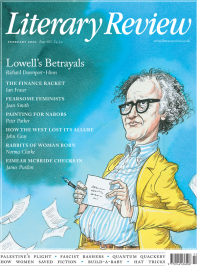Cornelius Dieckmann
Beyond a Joke
Tyll
By Daniel Kehlmann
riverrun 342pp £18.99
If Daniel Kehlmann has a speciality, it’s artful portraits of fraudsters, hypocrites and con artists. His debut, Beerholms Vorstellung (1997), published when he was twenty-two, tells the story of a theologian turned magician with a knack for cheating at poker. The postmodern short-story cycle Fame (2010) teems with mistaken identities and pathological impostors. And the novel F (2014) deals with a trio of brothers consisting of a secretly atheist priest, an art forger and an investment scammer. Kehlmann has also written the screenplay for a forthcoming adaptation of Thomas Mann’s Confessions of Felix Krull, one of postwar fiction’s most famous tales of deception.
It is only appropriate, then, that for his latest novel, Kehlmann has turned to the archetypical joker of German literature, Tyll Ulenspiegel. Notorious for outsmarting people by taking figures of speech literally and slipping away before he gets into trouble, the historical Ulenspiegel is supposed to have lived in Lower Saxony in the 14th century, working as a travelling entertainer. Tyll, which has sold more than 600,000 copies in Germany since its publication in 2017, removes the titular hero from late medieval times and places him in one of the most brutal periods of European history, the Thirty Years’ War. From 1618 to 1648, as Catholics fought Protestants for religious dominance and famine and pestilence beset central Europe, an estimated six million people died, including roughly a third of Germany’s population.
Tyll is an absorbing and, for a story about a prankster, remarkably sincere novel. As war sweeps over Germany, empirical fact is infiltrated relentlessly by superstition. A slow trickle of rumours carries knowledge of current and no longer current affairs to the peasants. ‘Leaflets came even to us,’ recalls an

Sign Up to our newsletter
Receive free articles, highlights from the archive, news, details of prizes, and much more.@Lit_Review
Follow Literary Review on Twitter
Twitter Feed
Under its longest-serving editor, Graydon Carter, Vanity Fair was that rare thing – a New York society magazine that published serious journalism.
@PeterPeteryork looks at what Carter got right.
Peter York - Deluxe Editions
Peter York: Deluxe Editions - When the Going Was Good: An Editor’s Adventures During the Last Golden Age of Magazines by Graydon Carter
literaryreview.co.uk
Henry James returned to America in 1904 with three objectives: to see his brother William, to deliver a series of lectures on Balzac, and to gather material for a pair of books about modern America.
Peter Rose follows James out west.
Peter Rose - The Restless Analyst
Peter Rose: The Restless Analyst - Henry James Comes Home: Rediscovering America in the Gilded Age by Peter Brooks...
literaryreview.co.uk
Vladimir Putin served his apprenticeship in the KGB toward the end of the Cold War, a period during which Western societies were infiltrated by so-called 'illegals'.
Piers Brendon examines how the culture of Soviet spycraft shaped his thinking.
Piers Brendon - Tinker, Tailor, Sleeper, Troll
Piers Brendon: Tinker, Tailor, Sleeper, Troll - The Illegals: Russia’s Most Audacious Spies and the Plot to Infiltrate the West by Shaun Walker
literaryreview.co.uk